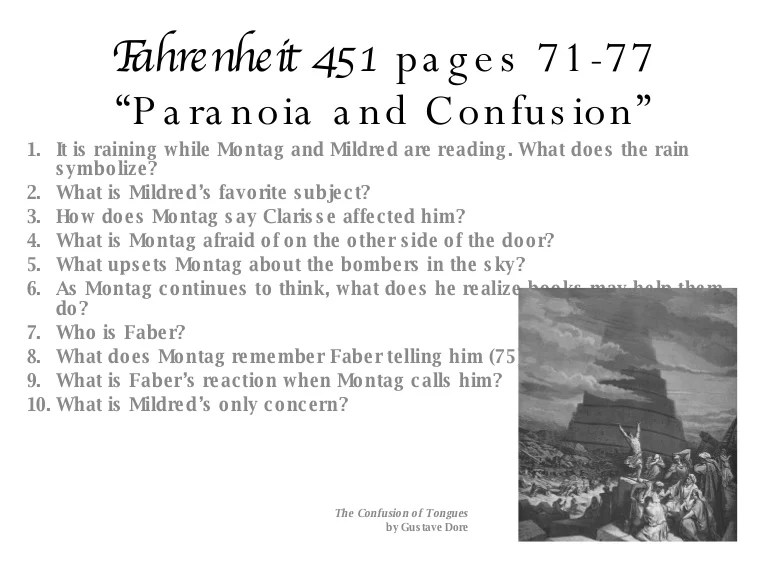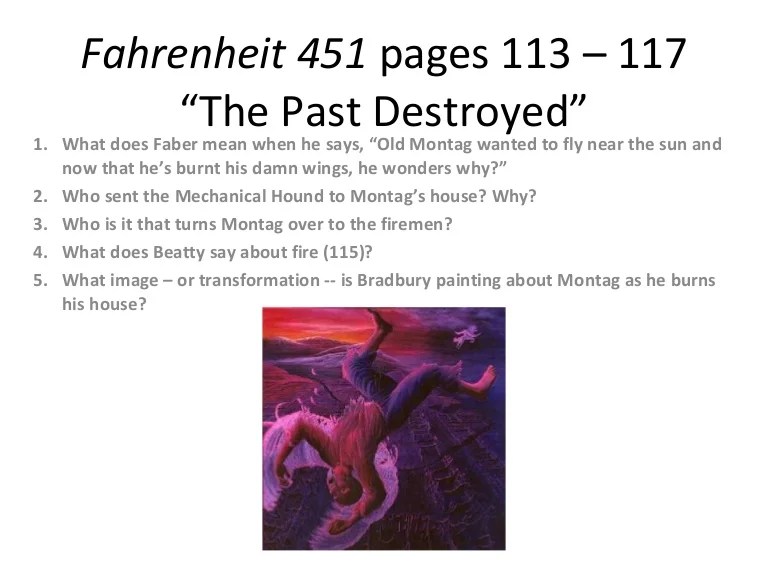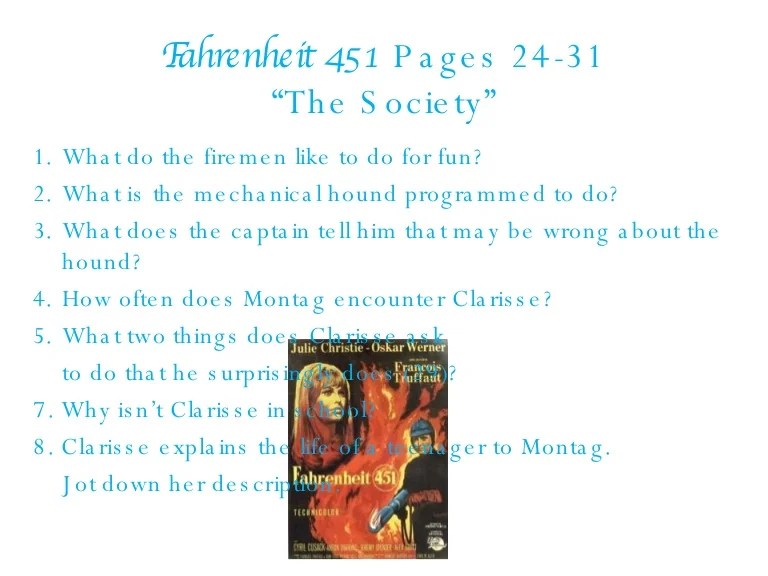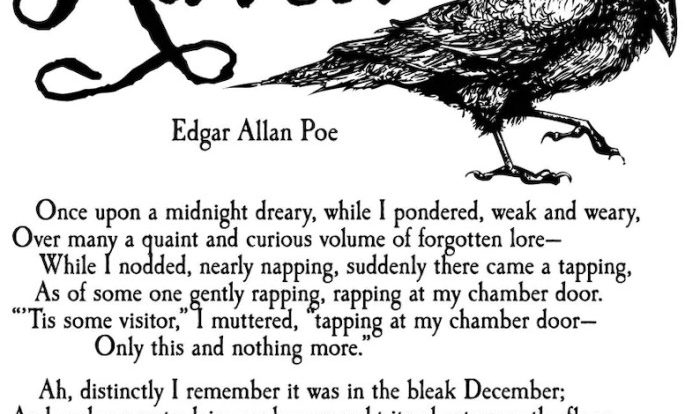Questions for Fahrenheit 451 Part 1 ignite a profound examination of censorship, technology, and the search for meaning. Ray Bradbury’s dystopian masterpiece raises thought-provoking questions that delve into the societal implications of suppressing knowledge, the dangers of unchecked technological advancement, and the enduring power of the human spirit.
In this literary exploration, we embark on a journey through Bradbury’s chilling world, where books are forbidden, and conformity reigns supreme. We grapple with the ethical dilemmas faced by characters like Montag, a fireman tasked with burning books, and Clarisse, a free-spirited rebel who challenges the oppressive status quo.
Censorship and Suppression

In Part 1 of Fahrenheit 451, Bradbury depicts a society where censorship and suppression are pervasive. The government enforces strict control over information, banning and burning books that challenge the status quo.
Forms of Censorship
- Book burning: The most visible form of censorship, books are ruthlessly destroyed by “firemen” to eliminate dissenting ideas.
- Media control: The government owns and operates all media outlets, ensuring that only approved messages reach the public.
- Educational suppression: Critical thinking and independent thought are discouraged in schools, where students are taught to memorize and conform.
Impact of Censorship
Censorship stifles intellectual growth, inhibits creativity, and promotes ignorance. It creates a society where people are afraid to question authority and blindly follow the dictates of the government.
The Role of Technology
Part 1 introduces advanced technology that plays a crucial role in enforcing censorship and controlling information.
Technological Surveillance, Questions for fahrenheit 451 part 1
- “Mechanical Hound”: A robotic dog that hunts down and kills those who possess forbidden books.
- “Seashells”: Small devices implanted in people’s ears that broadcast government propaganda and monitor conversations.
Information Control
Technology allows the government to manipulate and disseminate information as desired. They can suppress dissenting voices, spread propaganda, and create a false sense of reality.
Potential Dangers
While technology can enhance efficiency and communication, it also carries potential dangers. In the hands of oppressive regimes, it can be used to stifle dissent and control the population.
The Power of Knowledge and Memory: Questions For Fahrenheit 451 Part 1

Despite the censorship, books and knowledge play a vital role in Part 1. They represent freedom of thought, individuality, and the preservation of human history.
Importance of Books
Books contain ideas, stories, and perspectives that challenge the government’s narrative. They inspire critical thinking and encourage people to question their beliefs.
Montag’s Encounter with Literature
Montag’s interactions with Clarisse and Faber expose him to the power of literature. These encounters awaken his curiosity and challenge his assumptions about the society he lives in.
Role of Memory
In a society where books are destroyed, memory becomes a crucial tool for preserving knowledge. Montag memorizes passages from the books he burns, keeping their ideas alive.
Conformity and Dissent
Part 1 depicts a society where conformity is highly valued and dissent is met with severe consequences.
Pressure to Conform
- Social norms: People are expected to follow established social norms and avoid questioning authority.
- Government propaganda: The government uses media and educational systems to promote conformity and discourage dissent.
Individuals Who Challenge the Status Quo
Despite the pressure to conform, individuals like Clarisse and Faber emerge as symbols of dissent. They question the government’s actions and encourage Montag to think independently.
Consequences of Nonconformity
Those who deviate from the norm face isolation, persecution, and even death. Montag’s growing dissatisfaction with his life and work highlights the consequences of nonconformity.
The Search for Meaning

Montag’s journey in Part 1 is marked by a growing dissatisfaction with his life and a search for meaning.
Dissatisfaction with Work
As a “fireman,” Montag is responsible for destroying books. However, his encounters with Clarisse and Faber lead him to question his role in society.
Philosophical Questions
Part 1 raises philosophical questions about the meaning of life, the nature of truth, and the role of the individual in society.
Significance of the “Burning of the Books”
The “burning of the books” symbolizes the destruction of knowledge and the suppression of human spirit. It also represents Montag’s search for truth and purpose.
Questions and Answers
What are the different forms of censorship depicted in Fahrenheit 451 Part 1?
The novel portrays various forms of censorship, including book burning, media control, and the suppression of dissenting ideas.
How does technology contribute to censorship in the novel?
Technology, such as the “Mechanical Hound” and “Seashells,” is used to enforce censorship, monitor citizens, and instill fear.
What is the significance of books and knowledge in Fahrenheit 451 Part 1?
Books represent the preservation of ideas, the power of imagination, and the challenge to authoritarian rule.

